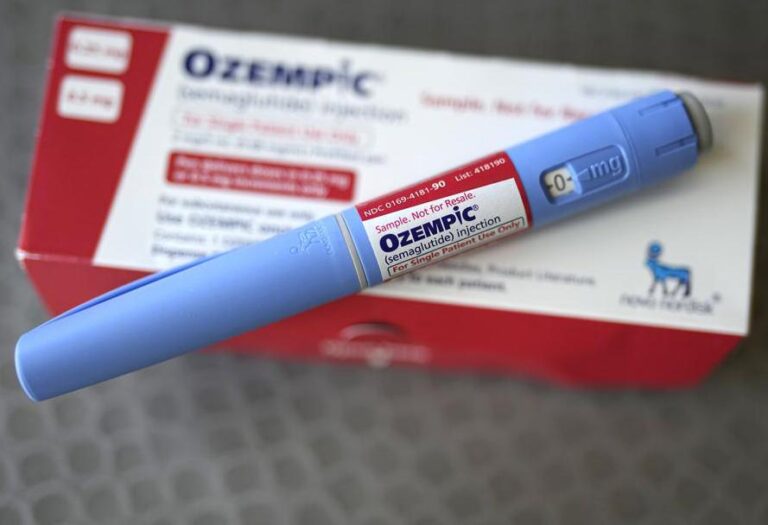The state’s largest commercial health insurer will stop covering a popular class of prescription drugs for weight loss, effective Jan. 1, citing soaring costs that are overwhelming insurers and employers.
Under its new policy, Blue Cross Blue Shield of Massachusetts said Thursday it will continue to cover the meds, known as GLP-1s, in its standard health benefits when they’re prescribed for diabetes — but not for obesity.
The insurer will give its largest segment of customers, employers with 100 workers or more, the option of retaining coverage of the drugs for weight loss by paying an extra charge in their health plans. Depending on how the plans are structured, this could also boost premiums for employees.
Blue Cross’s move is among the latest signs the surge in demand for GLP-1s, which doctors say provide broad health benefits to their patients, is pushing insurers and employers toward a financial breaking point.
“We’ve been hearing from employers, with increased alarm, about the cost of these medicines,’’ said Blue Cross spokesperson Amy McHugh. “They need some relief. We wanted to make sure employers have the choice.’’
Also on Thursday, the executive director of the Group Insurance Commission, the Massachusetts agency that provides health insurance for 460,000 state employees, said it’s been running a $20 million monthly deficit, partly due to rising claims from members taking GLP-1s to treat obesity. The executive director, Matthew Veno, said the commission is on track to run out of money by May 12, more than six weeks before the end of its annual budget cycle.
About 50,000 of Blue Cross’s 3 million members were taking GLP-1s as of Jan. 1, with 80 percent of those members taking it for weight loss. Under the new policy, people whose employers decline to cover the drugs would have to pay out of pocket. While there is variation, the average monthly retail price of the class of obesity medications is about $1,200 without insurance.
Sean O’Reilly, who teaches history and economics at Sharon High School, said his health has improved dramatically since his doctor prescribed Wegovy, a GLP-1, last June for weight loss. It’s only cost him a $25 monthly co-pay under his Blue Cross plan provided by the town of Sharon. But with a son heading to college next fall, he said he couldn’t pay the full cost out of pocket.
“It’s worked great for me,’’ said O’Reilly, whose weight had yo-yoed for years before he began taking the medication. “I’ve lost 75 pounds, I feel better, and I’m exercising more. My fear is I wouldn’t be able to afford it without insurance coverage. And people gain the weight back when they come off it.’’
Costs for five of the GLP-1 drugs — Ozempic, Mounjaro, Wegovy, Zepbound, and Saxenda — topped $300 million for Boston-based Blue Cross last year, more than double what it spent in 2023. The five medicines accounted for nearly 20 percent of all the insurer’s drug spending in 2024 and about one third of its year-over-year increase in costs, what’s known as “medical trend.’’
Massachusetts has more to lose than other states if major commercial insurance providers such as Blue Cross pull back from GLP-1 drug coverage.
About 140,400 obese patients in Massachusetts were prescribed medications such as Wegovy and Zepbound in 2024, a 255 percent increase from 2023, according to a Globe analysis of insurance claims data compiled by Real Chemistry, a health analytics firm. That was the third-biggest jump of any state, behind Oklahoma and Rhode Island.
The segment of the Blue Cross market most vulnerable to the new policy are members enrolled in “fully insured’’ plans where insurers set the terms of coverage. Self-insured plans offered by larger employers and administered by Blue Cross may be influenced by the policy change but have more flexibility since they pay their own claims.
Growing demand for the drugs fueled a combined loss of nearly $800 million in 2024 at Blue Cross and Point32Health, the state’s second largest commercial insurer. A spokesperson, Kathleen Makela, said Point32Health, which operates Harvard Pilgrim Health Plan and Tufts Health Plan, had no immediate plans to restrict GLP-1 coverage for weight loss.
But Point32Health’s executive chair, Eileen Auen, last month said the insurer planned to make Zepbound its preferred exclusive GLP-1 drug for the treatment of obesity, starting in July. The move was meant to reduce spending on weight loss drugs for the insurer, which recently laid off 110 people, or 2 percent of its workforce, as its finances deteriorated.
Employers have similarly been squeezed by the cost of GLP-1 drugs. At least three self-insured customers of Blue Cross — employers that pay their own insurance claims and thus aren’t subject to the terms of Blue Cross benefits — already have declined to cover the drugs for weight loss, McHugh said.
Jon Hurst, president of the Retailers Association of Massachusetts, which represents about 4,000 mostly smaller employers, said the Blue Cross policy change is a step in the right direction for cost-strapped businesses.
“We need more of this,’’ he said. “If you’re a small employer who wants to cover these drugs, you can find another insurer that still offers that coverage. But you shouldn’t be required to cover it just because your insurer is telling you to.’’
The policy change comes at a time when the rising cost of prescription drugs, including Alzheimer’s medicines and targeted cancer therapies, has become a pressing issue for state and federal policy makers. Drug makers say their medicines save money for the health system in the long run by preventing other diseases, but those savings aren’t immediately clear.
Last month, the Massachusetts Center for Health Information and Analysis reported that health care spending climbed 8.6 percent to $78.1 billion in 2023, more than double the state’s 3.6 percent annual growth benchmark. Health plans spent about 10 percent more, or about $1 billion, for prescription drugs, the fastest growing health cost. They accounted for 16.4 percent of all health care spending and 20 percent of the spending by commercial insurers.
Blue Cross began covering Saxenda in 2015 when federal regulators approved it to treat weight loss, adding coverage of Wegovy in 2021 and Zepbound in 2023. Ozempic and Mounjaro are only approved to treat diabetes.
McHugh said Blue Cross and its employer customers spent about $300 million on GLP-1s last year. While only about 3 percent of Blue Cross members take GLP-1s, about 2,000 members have been joining their ranks each month.
Robert Weisman can be reached at robert.weisman@globe.com.
Scooty Nickerson can be reached at scooty.nickerson@globe.com.


